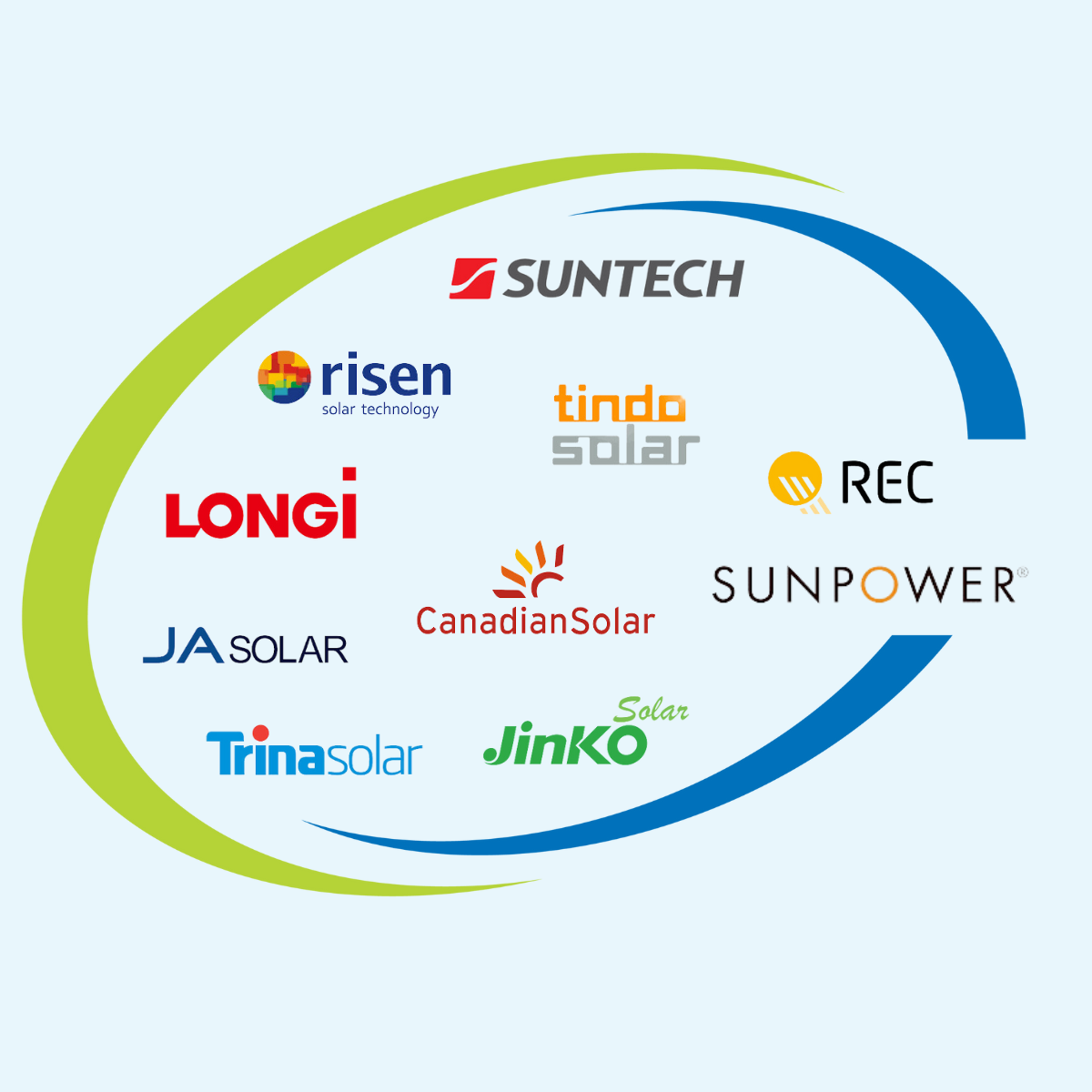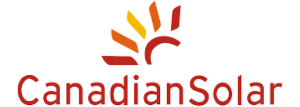‘The Circle of Trust’
In crafting our comprehensive solar panel guide, we draw from decades of experience working with various panel manufacturers. Below, we highlight our ‘inner circle’. These are the panel manufacturers we trust and confidently recommend for your home or business. While some may come at a premium, we stand by each recommendation within our ‘circle of trust’ for your installation needs
Please click on any manufacturer’s logo to be taken to a page with more specific details on that manufacturer.

What’s The Role of a Solar Panel?
Solar panel (aka PV modules) is an extremely important part of any Solar PV System. It’s what creates your own electricity and without them, you would have nothing!

Solar panels convert sunlight into electricity through a process called the photovoltaic effect:

- Sunlight Absorption: Solar panels absorb photons (light particles) from the sun.
- Electron Excitation: Photons transfer energy to electrons in the panel’s semiconductor material, causing them to move and generate a flow of direct current (DC) electricity.
- Inverter Conversion: The DC electricity is converted into usable alternating current (AC) electricity by an inverter.
How to Choose Wisely
In our solar panel guide, we emphasise reliability over short-term gains. Many solar companies offer panels that are readily available at competitive prices. However, not all suppliers maintain the same standards of durability and performance.
Unfortunately, the solar market can attract “cheap” operators and companies that may disappear soon after installation, leaving customers without support or recourse. To safeguard your investment, it’s crucial to partner with endorsed suppliers who prioritize:
- Quality Products: Endorsed suppliers offer solar panels that have undergone rigorous testing and have proven reliability even in harsh Australian environments.
- Long-Term Performance: These suppliers prioritize products that have demonstrated consistent performance over time, ensuring durability and efficiency throughout the lifespan of your solar system.
By choosing endorsed suppliers highlighted in our solar panel guide, you can be confident that you’re investing in solar panels that meet high standards of quality and longevity, providing peace of mind for years to come.
To see what solar panels your LOCALLY ENDORSED company uses, then don’t delay, take action now, and have a chat with the professionals.
Navigating ‘The Maze of Confusion’

Embarking on the journey to explore solar PV systems can feel overwhelming. The moment you show interest—whether by clicking an ad on social media or typing ‘solar’ into a search engine—the floodgates open. Suddenly, you’re bombarded with solar panel offers on every webpage and advertisement banner across the internet. This influx of information can be daunting, leaving you unsure of whom to trust or which offer is truly the best.
Navigating through this maze of options is where our solar panel guide can assist you. At Renewables4U, we understand the complexities and confusion that come with the solar market, which is why we’ve made it our mission to simplify the process for you. You can request quotes with the peace of mind the you will be contacted by quality, local and endorsed suppliers.
Our Commitment:
- Guidance Amidst Chaos: We’re here to help you cut through the noise, decipher the jargon, and make well-informed decisions.
- Trusted Network: We’ve curated a network of local, quality, and fully endorsed suppliers who prioritise your needs, offering products and services as if it were their own home or business.
- No-Obligation Quotes: Request quotes from our network of suppliers without any obligation, ensuring you receive tailored solutions for your unique requirements.
With Renewables4U, you can navigate ‘The Solar Maze’ with confidence, knowing that you have a trusted partner dedicated to your solar journey.
Key Considerations for Choosing Solar Panels
The type and brand of panel manufacturer that installation companies offer, can tell you a lot about the sort of business they are. Do they use well-established, tried and tested brands, with a long trading history behind them? Or are they using one of the new ‘no name’ solar panels that invariable pop up and then disappear just as quickly, leaving consumers with nowhere to go should they have any warranty claims in the future?

Please take a look at our recommended solar panel options on the chart on this page. If you are offered a panel that isn’t on this chart, then please feel free to send us an email. We’ll gladly let you know what we know and feel about them from a neutral perspective.
1. Solar Panel Efficiency
Solar panel efficiency refers to the ability of a solar panel to convert sunlight into usable electricity. This efficiency is measured as a percentage of the sunlight that strikes the panel and is converted into electrical energy. For example, a solar panel with 20% efficiency converts 20% of the sunlight it receives into electricity. Currently, most solar panels on the market offer efficiencies ranging from 20% to 23%.
Key Points:
- Higher Efficiency, Higher Output: Panels with higher efficiency can produce more electricity per square meter, potentially reducing the number of panels needed to meet energy requirements.
- Cost Consideration: Higher-efficiency panels often come at a higher cost upfront. However, they may result in long-term savings due to their ability to generate more electricity efficiently.
- Other Influencing Factors: Solar panel efficiency can be influenced by factors like panel orientation, sunlight exposure, and temperature. While efficiency is important, it’s not the sole factor determining panel performance.
Choosing the Right Efficiency:
- Efficiency above 20% is generally considered effective for most applications. Factors such as system design, installation quality, and local climate should also be considered when selecting solar panels.
Understanding solar panel efficiency helps in making informed decisions about your solar energy system, balancing cost, performance, and overall energy needs effectively.
2. Solar Panel Specifications
Each solar panel comes with specific technical details that describe its performance and characteristics, crucial for choosing the right panel for your needs.

Key Specifications of Solar Panels Explained :
- Wattage (Power Output): Indicates the amount of power a solar panel can produce under standard conditions, measured in watts (W) or kilowatts (kW)
- N-Type or P-Type Solar Panels: N-Type panels use premium semiconductor materials for better performance and durability but come at a higher cost. P-Type panels are more cost-effective but may degrade faster in later years.
- Mono-Facial or Bi-Facial Panels: Mono-Facial Panels: Capture sunlight on the front face only and suitable for standard rooftop installations. Bi-Facial Panels: Capture sunlight on both front and back sides, potentially benefiting from reflected light in certain environments.
- Power Tolerance: Describes the range of power output variation under different conditions, expressed as a percentage (e.g., +/- 5%). The lower the % variation, the better.
- Efficiency: Represents the percentage of sunlight converted into electricity. Higher efficiency panels generate more power in less space.
- Voltage: Maximum voltage output of the panel when no load is connected. Critical for system design and component compatibility.
- Current: Flow of electrical charge (measured in amps) that a solar panel can deliver, crucial for system design and performance.
- Temperature Coefficient: Reflects how panel performance changes with temperature. Lower coefficients indicate better performance in hot weather.
- Dimensions: Physical size of the panel, important for installation layout and required surface area.
- Warranty: Guarantees the panel’s performance level over time, typically measured in years.
Understanding these specifications helps in selecting solar panels that align with your energy requirements, installation space, and budget.
3. Solar Panel Cost
The Solar Panel Guide emphasises that the cost of solar panels is a critical consideration when selecting a solar energy system for your home or business. Solar panel prices vary based on factors like brand, type, and efficiency. It’s important to weigh the upfront cost against the long-term savings and benefits of renewable energy when making your decision. This evaluation helps determine the most cost-effective solar solution for your needs.

Panel Cost Breakdown:
- Price Range: Solar panels of decent quality typically range from 40 cents to $1.30 per watt, including GST. This cost solely covers the panels themselves and does not include installation or additional components.
- Budget Considerations: While quality is essential for longevity, it’s vital to align the cost of panels with your budget. Higher-efficiency panels generally come at a higher price point.
Installation:
- Professional Installation: Investing in professional installation ensures that your solar panels are correctly and safely installed. However, this service adds to the overall cost of your solar energy system.
Balancing Cost with Quality:
- Holistic Evaluation: When choosing a solar panel, consider factors beyond cost alone, such as efficiency, durability, and warranty coverage.
Conclusion:
The cost of solar panels is a significant consideration in selecting a solar energy system. While it’s essential to stay within budget, striking a balance between cost and quality ensures a system that delivers efficient, long-lasting solar power for years to come.
4. Solar Panel Quality and Warranty
The quality and warranty of a PV module (solar panel) are critical considerations for your solar energy system:
Module Quality:
The quality of PV modules depends on the materials and manufacturing processes used. Manufacturers build high-quality panels with durable materials that resist weather and degradation. They undergo stringent quality control to meet industry performance standards.
Warranty Importance:
A robust warranty safeguards your investment against defects. Solar panel warranties typically range from 15 to 30 years, covering repair or replacement costs. Pay attention to warranty details—some require sending panels back, while others offer on-site service.
Quality and Warranty Relationship:
Higher-quality panels come with longer, more comprehensive warranties, reflecting manufacturer confidence in their products.
Differentiating Warranties:
- Product/Manufacturer Warranty: Crucial for coverage against defects, with reputable manufacturers offering warranties of 15 to 30 years.
- Performance Warranty: Guarantees minimal degradation over 25 years but can be complex to enforce.

Opt for panels with a robust product warranty (minimum 15 years) for peace of mind and reliable performance throughout your solar system’s lifespan
5. Solar Panel Manufacturer Location
The global conversation around manufacturing origin has grown, especially with recent events. While there are valid concerns, it’s important to recognise China’s role as a manufacturing powerhouse, they manufacture many high-quality products, including Apple devices, EVs, furniture, and appliances.

When it comes to solar panels, Chinese-made panels are prevalent and often more affordable than those from other countries. Despite the perception, quality can be exceptional. For example, Suntech panels are VDE certified and recommended in our solar panel guide.
The VDE mark signifies rigorous safety and quality testing conducted in Germany, reflecting the panels’ reliability and adherence to strict standards. Manufacturing location does not compromise quality. China can and does deliver exceptional products with proper certification.
Curious about which manufacturers lead Australian the market? Explore our top-pick list of the best solar panel brands to make an informed choice.







